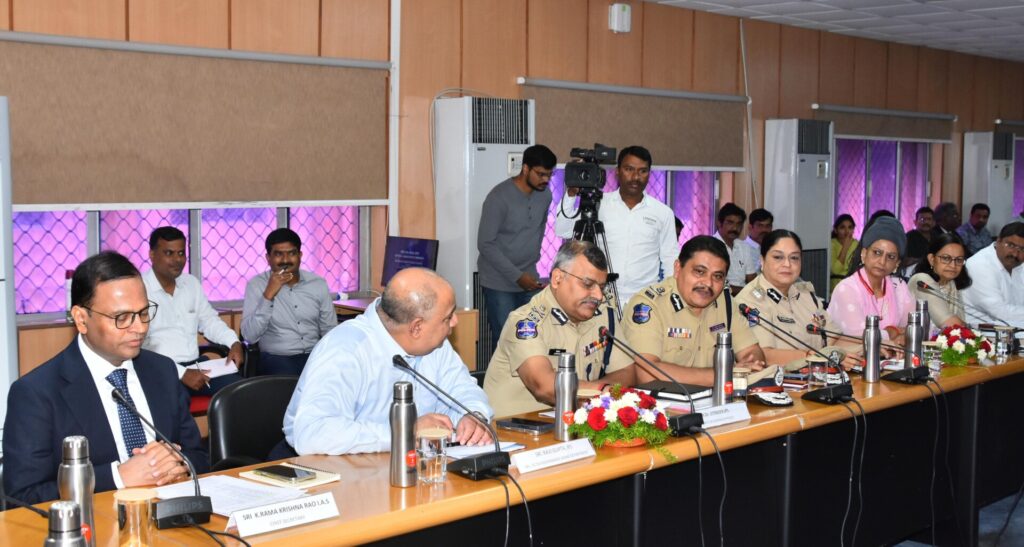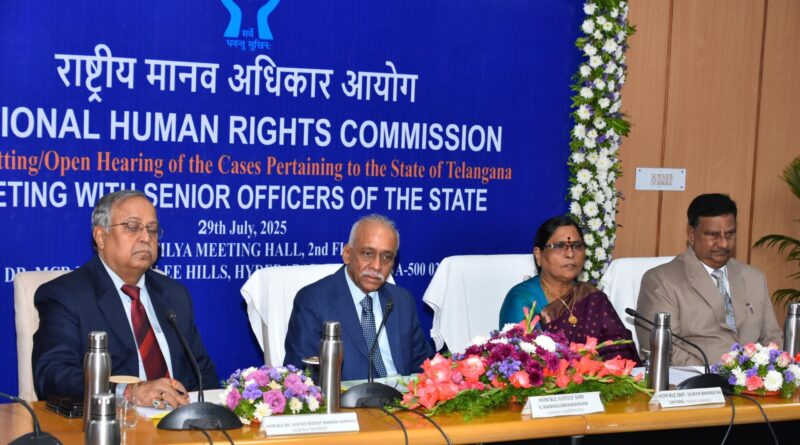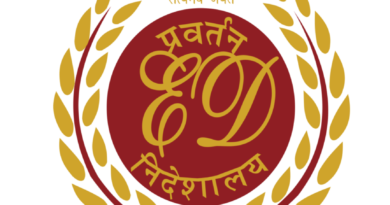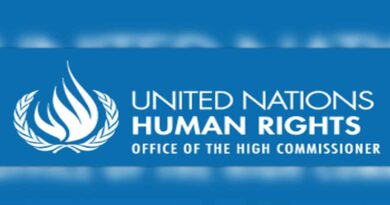NHRC Reviews Telangana’s Human Rights Framework in High-Level Meeting
(Syed Ali Taher Abedi)
As part of its two-day Camp Sitting in Telangana, the National Human Rights Commission (NHRC) convened a high-level meeting with senior officials of the Government of Telangana at Dr. MCR HRD Institute, Jubilee Hills, Hyderabad. The purpose of the meeting was to review critical human rights concerns and evaluate the State’s initiatives in addressing systemic issues through institutional frameworks and welfare-oriented interventions.
The meeting was chaired by Hon’ble Justice V. Ramasubramanian, Chairperson of the NHRC, and attended by Hon’ble Members Justice Bidyut Ranjan Sarangi and Smt. Vijaya Bharati Sayani. Hon’ble Justice Dr. Shameem Akhtar, Chairperson of the Telangana State Human Rights Commission, also participated. Senior NHRC officials present included Secretary General Mr. Bharat Lal, Director General (Investigation) Mr. R.P. Meena, Deputy Registrar (Law) Mr. Indrajeet, Dr. Mukesh, and Senior Superintendent of Police (Investigation) Ms. Ilakkiya Karunagaran, IPS.
The Chief Secretary of Telangana, Mr. Ramakrishna Rao, IAS, led a high-level State delegation during an important deliberative session with the Commission, representing a multi-departmental team comprising senior officials from pivotal sectors. These included the Departments of Home, Women and Child Development, Education, Forest, Agriculture, Finance, Scheduled Caste (SC) Development, and Police. The deliberations spanned a wide range of critical issues, focusing on crimes against women and children, malnutrition, human-wildlife conflict, educational disparities, SC welfare, farmers’ distress, and the rights of LGBTQI+ communities.

Mr. Ravi Gupta, IPS, Special Chief Secretary (Home), played a key role in coordinating interdepartmental inputs and perspectives. He emphasized the State Government’s untiring commitment to the principles of the rule of law, institutional transparency, and the continuous enhancement of administrative mechanisms, especially in the domain of human rights enforcement.
Ms. Charu Sinha, IPS, Additional Director General of Police (Women Safety & CID), provided a comprehensive overview of initiatives aimed at strengthening women’s safety and promoting the rights and welfare of LGBTQI+ individuals. She highlighted the expansion of the acclaimed SHE Teams, which are dedicated units tackling harassment and gender-based violence. Additionally, she reported on the operationalization of Bharosa Centres, which offer integrated support to women and children facing abuse, and the establishment of Maithri Clinics across districts. These clinics serve as specialized health facilities for transgender individuals, staffed with trained medical professionals. Ms. Sinha also mentioned affirmative efforts to employ transgender persons as traffic assistants and the provision of legal support through Telangana State Legal Services Authority’s legal aid clinics.
Ms. Anita Ramachandran, IAS, Principal Secretary, Department of Women and Child Development, addressed two pressing concerns: crimes against children and malnutrition. She detailed the integrated child protection frameworks adopted by the State, along with a convergence model that aligns the efforts of frontline workers such as Anganwadi workers, ASHAs, and members of Self-Help Groups. Notable schemes such as Aarogya Lakshmi and Bala Amrutam were discussed for their impact in delivering hot, nutritious meals to children, pregnant women, and lactating mothers, thereby addressing early childhood malnutrition and maternal health.
Ms. C. Suvarna, IFS, Principal Chief Conservator of Forests, presented the State’s comprehensive strategy to manage the growing challenges of man-animal conflict. She elaborated on contributing factors such as habitat fragmentation and encroachments, and emphasized the need for a balanced approach between environmental conservation and the rights and livelihoods of forest-dwelling and tribal communities. She further highlighted the implementation of the Forest Rights Act and the utilization of CAMPA (Compensatory Afforestation Fund Management and Planning Authority) funds to support ecological restoration and conflict mitigation.
Ms. K. Shitija, IFS, Managing Director of the SC Corporation, presented the State’s initiatives aimed at empowering Scheduled Castes through targeted socio-economic programs. She elaborated on key livelihood-based interventions such as Rajiv Yuva Vikasam and underscored the importance of financial inclusion, entrepreneurship development, and capacity-building initiatives to ensure sustainable development and long-term upliftment of SC communities.
Mr. Naveen Nicolas, IAS, Commissioner of School Education, offered a detailed briefing on steps taken to improve access to and quality of primary education across Telangana. His presentation included updates on schemes such as the free distribution of textbooks, notebooks, uniforms, and provision of mid-day meals. He also discussed innovations like facial recognition-based student attendance and large-scale enrolment drives under the Badibata campaign. To further curb dropout rates and enhance access, he announced plans to establish new government schools in underserved and remote regions.
Mr. B. Gopi, IAS, Director of Agriculture, shed light on various welfare programs launched to address the distress of the agricultural community. Among these, Rythu Bharosa (support for farmers), Rythu Bima (crop insurance), and loan waiver schemes were emphasized as key components of the State’s approach to strengthen farmer security. He reiterated the government’s focus on timely financial assistance, robust crop insurance, and improved market access to ensure agricultural sustainability and protect farmers’ livelihoods.
In his concluding remarks, Hon’ble Chairperson of the Commission, Justice V. Ramasubramanian, acknowledged the extensive efforts made by the Telangana State Government. He affirmed the role of the Commission as both a constitutional watchdog and a cooperative partner to the executive. “India has well-formulated laws and progressive welfare schemes,” he stated. “The real challenge lies in their effective implementation and in ensuring accountability.” He lauded the Telangana Government for its proactive participation and transparent engagement during the Camp Sitting.
Chief Secretary Mr. Ramakrishna Rao, IAS, closed the proceedings by expressing sincere gratitude to the Commission for its guidance and constructive engagement. He reaffirmed the State’s dedication to fostering a governance model rooted in human rights, transparency, and accountability. He assured that Telangana would continue its efforts to strengthen rights-based service delivery and uphold the dignity and welfare of all citizens.



